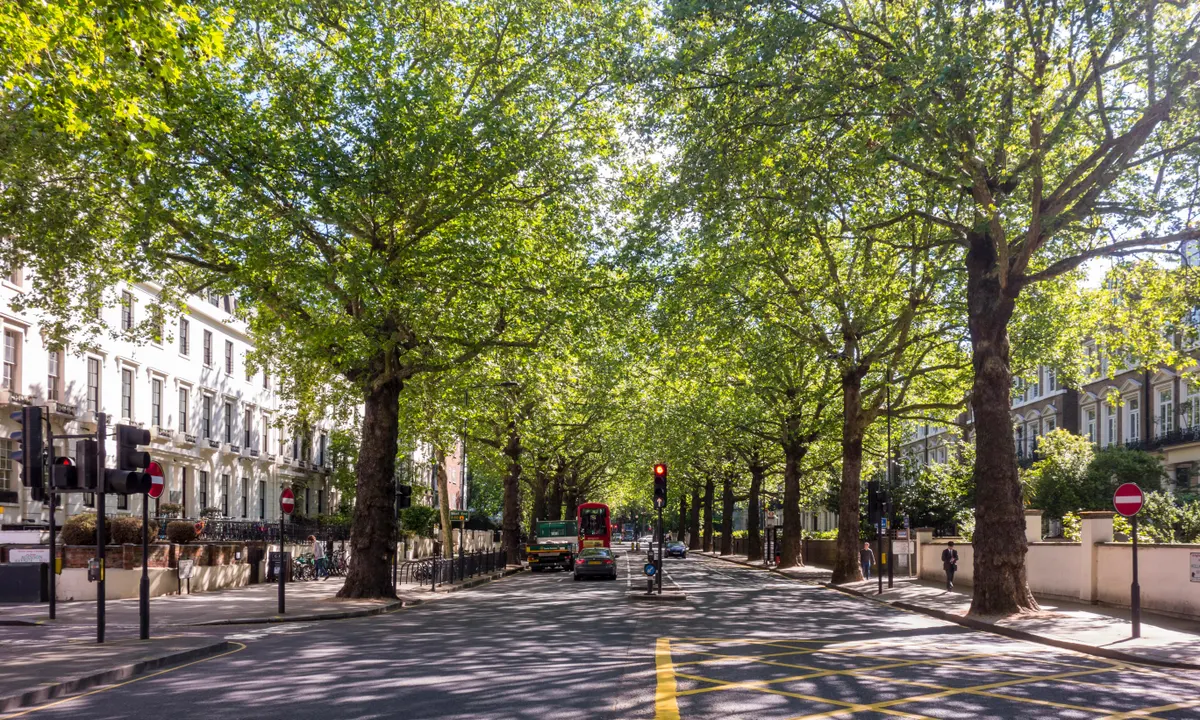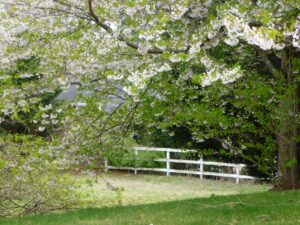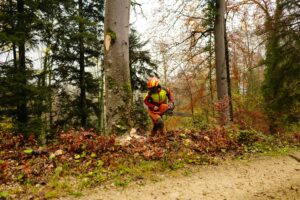THE ROLE OF TREES IN IMPROVING MENTAL HEALTH
THE ROLE OF TREES IN IMPROVING MENTAL HEALTH
The connection between nature and mental health is a well-established and scientifically supported concept that highlights the positive impact of natural environments on psychological well-being. This relationship has been recognized for centuries across different cultures, but modern research has provided deeper insights into how exposure to nature, including trees and green spaces, can significantly improve mental health. Here’s how the connection works:

- Stress Reduction: Spending time in natural settings, such as forests, parks, or even tree-lined streets, has been shown to reduce stress levels. The natural environment promotes relaxation and has a calming effect on the mind. The sights, sounds, and smells of nature can activate the parasympathetic nervous system, which helps to counteract the “fight or flight” response associated with stress.
- Mood Enhancement: Nature exposure is linked to improved mood and a decrease in symptoms of anxiety and depression. The outdoor environment, especially one with trees and greenery, can trigger the release of neurotransmitters like serotonin and dopamine, often referred to as “feel-good” chemicals. These neurotransmitters are associated with happiness and pleasure.
- Cognitive Restoration: Spending time in nature, particularly in settings with trees, provides a break from the constant demands of modern life. This allows the brain to rest and recover from cognitive fatigue. Nature is believed to support attention restoration, enhancing concentration and problem-solving abilities.
- Social Interaction and Community: Natural environments, including tree-filled spaces, encourage social interactions and a sense of community. Parks, for instance, provide spaces for people to gather, engage in recreational activities, and build social connections. These interactions contribute to a sense of belonging and support, which are crucial for mental well-being.
- Biophilia and Evolutionary Connection: Biophilia is the innate human tendency to seek connections with nature and other forms of life. Evolutionarily, humans have spent the majority of their history in natural settings. As a result, being in nature, surrounded by trees and greenery, can trigger a sense of comfort and belonging, evoking positive emotions.
- Sensory Engagement: The sensory experiences provided by natural environments, such as the rustling of leaves, the scent of flowers, and the sight of flowing water, engage our senses in a way that can reduce anxiety and promote relaxation. These sensory stimuli have a soothing effect on the nervous system.
- Mindfulness and Presence: Nature naturally promotes mindfulness – the practice of being fully present in the moment. When surrounded by the beauty of trees and natural landscapes, people often find it easier to focus on the present, which can help alleviate rumination and worries associated with mental health issues.
- Physical Activity: Engaging with nature often involves physical activity, such as walking, hiking, or gardening. Physical exercise is known to have positive effects on mental health, as it releases endorphins, reduces stress, and contributes to a sense of accomplishment.
- Connection with Natural Rhythms: Being in nature exposes individuals to natural rhythms, such as the rising and setting of the sun. This can help regulate sleep patterns, which play a crucial role in mental health.
Overall, the connection between nature and mental health underscores the importance of incorporating natural environments, including tree-filled spaces, into our lives. Whether through planned outdoor activities, spending time in local parks, or simply enjoying the presence of trees in our surroundings, these interactions have the potential to significantly enhance our psychological well-being.
Importance of Understanding this Relationship, Especially in Urbanized and Digitally Connected Societies
Understanding the relationship between nature and mental health, especially in urbanized and digitally connected societies, is of paramount importance due to several compelling reasons:

A low angle shot of snowy trees in the forest on a clear day
- Rising Mental Health Concerns: Urbanization and the digital age have brought about a significant increase in mental health issues such as stress, anxiety, and depression. The fast-paced, always-connected lifestyle of modern cities can lead to mental overload. Understanding how nature can counteract these effects is crucial for addressing these growing concerns.
- Nature Deficit: Urbanized societies often suffer from a “nature deficit,” where individuals have limited access to green spaces and natural environments. Recognizing the impact of this deficit on mental health emphasizes the need for intentional efforts to incorporate nature into urban planning and individual routines.
- Technological Overload: Digitally connected societies are often characterized by constant screen time, information overload, and reduced face-to-face interactions. This can lead to increased stress, sleep disturbances, and feelings of isolation. Understanding the role of nature in mental health highlights an effective way to counterbalance the negative effects of technology.
- Urban Stressors: Urban environments introduce unique stressors such as noise pollution, air pollution, and crowded spaces. These stressors can have adverse effects on mental health. Recognizing the role of nature as a natural stress buffer encourages the creation of green spaces within cities, offering residents a respite from urban stressors.
- Holistic Health: Mental health is closely intertwined with physical well-being. Understanding the benefits of nature on mental health supports a holistic approach to health that encompasses both physical and psychological aspects. This awareness can lead to more comprehensive healthcare strategies.
- Preventive Care: Incorporating nature as part of mental health initiatives can serve as a proactive and preventive measure. By encouraging individuals to engage with nature regularly, societies can potentially reduce the incidence of mental health disorders and improve overall well-being.
- Enhancing Urban Livability: A city’s livability and attractiveness are closely tied to the presence of green spaces and a connection to nature. Understanding this relationship can motivate city planners and policymakers to prioritize the integration of parks, gardens, and tree-lined streets into urban landscapes.
- Education and Awareness: Recognizing the link between nature and mental health allows for education and awareness campaigns. This empowers individuals to make informed choices about their well-being and motivates communities to advocate for accessible green spaces.
- Economic Impact: Poor mental health has economic implications, including reduced productivity and increased healthcare costs. Understanding the benefits of nature on mental health can lead to cost savings through improved employee well-being and reduced healthcare expenditures.
- Sustainable Urban Development: Cities are engines of growth and innovation, but they also consume vast resources and generate environmental impacts. Recognizing the role of nature in mental health encourages sustainable urban development that prioritizes both human well-being and environmental preservation.
- Cultural and Social Benefits: Understanding the relationship between nature and mental health highlights the cultural and social significance of natural spaces. These spaces become settings for community gatherings, outdoor activities, and cultural events, enhancing the overall quality of life.
In conclusion, comprehending the connection between nature and mental health in urbanized and digitally connected societies is essential for addressing mental health challenges, promoting well-being, and creating healthier, more sustainable communities. By prioritizing access to nature and incorporating it into the fabric of modern life, societies can foster mental resilience and contribute to a better overall quality of life.
Positive Effects of Nature on Psychological Well-Being
The positive effects of nature on psychological well-being, often referred to as “nature’s therapeutic benefits,” are well-documented through research and experience. These effects encompass a wide range of psychological and emotional improvements that individuals experience when they engage with natural environments, including forests, parks, gardens, and tree-filled spaces. Here’s an explanation of some of these positive effects:

- Stress Reduction: Nature is known to have a calming effect on the human mind. The sights, sounds, and smells of natural settings can trigger the relaxation response, which helps reduce stress levels. Exposure to nature has been linked to lower heart rates, reduced blood pressure, and decreased levels of stress hormones like cortisol.
- Mood Enhancement: Spending time in nature is associated with improved mood and a sense of well-being. Natural environments, especially those with trees and greenery, have been shown to stimulate the release of neurotransmitters such as serotonin and dopamine. These chemicals play a vital role in regulating mood and emotions, contributing to feelings of happiness and contentment.
- Anxiety and Depression Alleviation: Nature exposure has been found to alleviate symptoms of anxiety and depression. Natural environments provide a temporary escape from the demands of daily life, reducing rumination and negative thought patterns. The tranquility and beauty of nature contribute to a sense of peace and emotional relief.
- Enhanced Cognitive Function: Interacting with nature can enhance cognitive function. The experience of natural settings is often free from the constant stimuli and multitasking associated with urban and digital environments. This break from cognitive demands allows the brain to recharge, leading to improved focus, attention, and creative thinking.
- Restoration of Mental Fatigue: Nature facilitates mental restoration by offering a break from directed attention and mental fatigue. This restoration occurs through the process of involuntary attention, where individuals can immerse themselves in the sensory experiences of nature without effort.
- Positive Body Image and Self-Esteem: Natural environments provide spaces for physical activity and exploration. Engaging in outdoor activities can promote positive body image and self-esteem, as individuals focus on the enjoyment of movement rather than the pursuit of appearance-related goals.
- Sense of Connection: Nature fosters a sense of connection – both to the environment and to others. Being in natural settings, especially those with trees and greenery, can evoke feelings of interconnectedness and belonging. This sense of connection can combat feelings of isolation and loneliness.
- Mindfulness and Presence: Nature encourages mindfulness, a state of being fully present in the moment. The sensory experiences of nature – such as the rustling of leaves, the chirping of birds, and the feel of the breeze – can anchor individuals in the present, promoting mindfulness and reducing anxiety about the past or future.
- Improved Sleep: Exposure to natural light, fresh air, and the natural rhythms of day and night can regulate the body’s internal clock and improve sleep quality. Adequate sleep is essential for maintaining mental well-being.
- Promotion of Positive Social Interaction: Natural settings, including tree-rich environments, provide spaces for social interaction, outdoor gatherings, and recreational activities. These interactions contribute to a sense of community and support, enhancing overall psychological health.
- Biochemical Effects: The scents released by trees and plants, such as phytoncides, have been found to have positive effects on the nervous system. Breathing in these natural compounds can lead to reduced stress and improved emotional well-being.
Overall, the positive effects of nature on psychological well-being underscore the importance of incorporating time in natural environments, including those with trees and greenery, into our lifestyles. Whether through outdoor activities, mindfulness practices, or simply taking a walk in a park, these interactions have the potential to enhance mental health and contribute to a more balanced and fulfilling life.
About Murray, Utah
Murray is a city situated on the Wasatch Front in the core of Salt Lake Valley in the U.S. state of Utah. Named for territorial governor Eli Murray, it is the state's fourteenth largest city. According to the 2020 census, Murray had a population of 50,637. Murray shares borders with Taylorsville, Holladay, South Salt Lake and West Jordan, Utah. Once teeming with heavy industry, Murray's industrial sector now has little trace and has been replaced by major mercantile sectors. Known for its central location in Salt Lake County, Murray has been called the Hub of Salt Lake County. Unlike most of its neighboring communities, Murray operates its own police, fire, power, water, library, and parks and recreation departments and has its own school district. While maintaining many of its own services, Murray has one of the lowest city tax rates in the state.
Neighborhoods in Murray, Utah
Murray Oakes, Grant Park, Southwood Park, Murray Park, Murray Park Restrooms, Willow Pond Park, Neighborhood Veterinary Care
Things To Do in Murray, Utah
Bus Stops in Murray, Utah to Truco Services, Inc.
Bus Stop in Murray Central Station (Bay C) Murray, Utah to Truco Services, Inc.
Bus Stop in State St @ 4801 S Murray, Utah to Truco Services, Inc.
Bus Stop in Murray North Station Murray, Utah to Truco Services, Inc.
Bus Stop in State St @ 4949 S Murray, Utah to Truco Services, Inc.
Bus Stop in Murray Central Frontrunner/Trax Station Murray, Utah to Truco Services, Inc.
Bus Stop in Murray Blvd / Vine St (SB) Murray, Utah to Truco Services, Inc.
Bus Stop in State St @ 3925 S Murray, Utah to Truco Services, Inc.
Bus Stop in State St @ 4824 S Murray, Utah to Truco Services, Inc.
Bus Stop in State St @ 5223 S Murray, Utah to Truco Services, Inc.
Bus Stop in Murray Blvd / Allendale Dr (NB) Murray, Utah to Truco Services, Inc.
Bus Stop in Murray Blvd @ 5039 S Murray, Utah to Truco Services, Inc.
Bus Stop in State St @ 4721 S Murray, Utah to Truco Services, Inc.
Driving Directions in Murray, Utah to Truco Services, Inc.
Driving Directions from Woodruff Tree Trimming and Removal to 4640 Commerce Dr, Murray, UT 84107, USA
Driving Directions from Reliable Tree Care to 4640 Commerce Dr, Murray, UT 84107, USA
Driving Directions from Tree Pro-Tech to 4640 Commerce Dr, Murray, UT 84107, USA
Driving Directions from Prestige Tree And Landscape to 4640 Commerce Dr, Murray, UT 84107, USA
Driving Directions from Excellence Tree & Landscape to 4640 Commerce Dr, Murray, UT 84107, USA
Driving Directions from Amen Trees to 4640 Commerce Dr, Murray, UT 84107, USA
Driving Directions from Tim's Tree Care to 4640 Commerce Dr, Murray, UT 84107, USA
Driving Directions from Jordan Tree Service - Murray to 4640 Commerce Dr, Murray, UT 84107, USA
Driving Directions from Arbor Works to 4640 Commerce Dr, Murray, UT 84107, USA
Driving Directions from Diamond Tree Experts to 4640 Commerce Dr, Murray, UT 84107, USA
Driving Directions from Green Tree Arborist to 4640 Commerce Dr, Murray, UT 84107, USA
Driving Directions from TruCo Services to 4640 Commerce Dr, Murray, UT 84107, USA
Reviews for Truco Services, Inc. Murray, Utah
Emily Abercrombie
We had a great experience with TruCo! They were well priced, responsive and prompt. Michael was a pleasure to work with and gave us advice on which plants to put in where we took out our ugly old shrubs. I would highly recommend this company!!!
Michelle Turpin
TruCo Services gets 5 stars from us for customer service. We experienced a few issues with their services this last year and Rob Eccles in senior management, stepped in and immediately handled our issues. He was very committed to making sure they understood our expectations and would execute to make us happy.
Siobhan Billingsley
I work for a property management company and have the pleasure of working with Rob at a community in Sandy. He has been incredible to work with and always responds in a timely manner. He knows all the homeowners by name and address and is aware of all the "problem" areas when it comes to sprinklers. I never have to worry about following up with him because he always reaches out to provide me with an update. If you're looking to work with someone who takes pride in their job, is professional, and can solve the worst landscaping problems thrown your way, Rob is your guy. Thank you, Rob for all you do!
Jaime S.
We have used Truco at 2 of the complexes we manage, they have been great to work with. Good quality service, outstanding customer service with good communication. That's hard to find these days. I highly recommend them. Travis has been awesome to work with.
Jerusha Smart
We use TruCo for a majority of our properties and our home. While other landscaping companies we use come and go for various reasons like cost, communication issues, work performance, etc., TruCo is always consistent in price and work. Also, Rob is the best.

